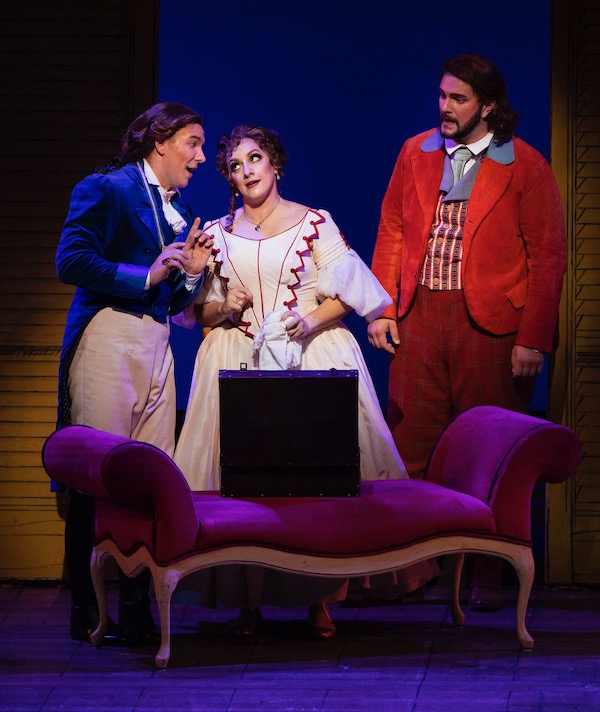Palm Beach Opera offers a trim, well-sung “Barber of Seville”

After the conclusion of the famous Overture to Rossini’s Barber of Seville, Palm Beach Opera chief conductor David Stern invited the orchestra to stand to receive the applause.
The musicians deserved it, for their playing was a highlight of the company’s fine production of the comic opera classic, which opened Friday night at the Kravis Center in West Palm Beach. The sets were fairly low budget, but high-quality singing, imaginative stage direction and the orchestra’s performance did justice to Rossini’s opera buffa.
The Overture, fortunately, was not marred by any madcap antics on stage, full of crisp string playing, such as in the mock-sinister minor-key theme that sounds like snipping barber scissors. Despite some wayward horn playing, Stern led a spirited performance, with thumps of drums and cymbals, through crescendos and accelerandos, that gave the opera a propulsive start.
The baritone Andrew Manea inhabited the role of Figaro with the easy confidence of a man who knows he doesn’t have to strain to be the center of attention. He entered the stage on a wheeled cart displaying the tools of his trade. With his red and white striped vest, white shirt and red pants, he looked like a walking barber pole.
“Largo al factotum,” the famous aria in which he humblebrags that everyone wants a piece of him, was full of stentorian, pompous high notes and assured confidence. In one nice touch, he started the endlessly parodied “Figaro, Figaro” passage while admiring himself in a hand-held mirror. He gave a nimble, well- articulated account of the blindingly fast patter section, although he was a little hard to hear over the orchestra.
As Rosina, the mezzo-soprano Aleks Romano was a late substitute for the ailing Daniela Mack. Romano expertly and subtly portrayed a young woman chafing under the domination of tyrant, conveying her irritation through a glare or roll of the eyes.
She gave an unusually rich and dark-hued account of “Una voce poco fa,” with lots of personality, a sweet, yearning urgency and clear, sharply articulated coloratura, with deftly executed runs and ornaments. In one imaginative move, stage director Helena Binder required her to try on a series of new shoes delivered by a servant, a requirement that didn’t ease the singer’s task in a difficult aria, but Romano handled it like a pro.
The tenor Taylor Stayton was an earnest, love-struck Count Almaviva. He displayed a refined, smooth voice in “Ecco, ridente in cielo,” his first love song to Rosina, casually tossing off the runs. He brought a melancholy tone and immaculate phrasing to the heartfelt aria in which he lies to Rosina about his name. He handled the comic side of his role with gusto, as he impersonated a drunk soldier and the world’s most irritating music teacher.
The ultimate butt of the jokes in Barber is Doctor Bartolo, the uptight physician scheming to marry his young ward Rosina and grab her fortune. Just as a great hero needs a great villain, the resourceful Figaro is faced off against the self-important Bartolo.
The baritone Renato Girolami was a burly stage presence as he tried desperately to keep a grasp on his schemes and hold onto what remained of his dignity. With his booming middle register, he was the model of affronted pomposity in “A un dottor della mia sorte,” in which he reprimands Rosina for failing to put enough effort into her lies to him. As with Figaro, however, it was hard to hear the patter section of the aria over the orchestra.
Comic operas of Rossini’s era often provided the pleasure of seeing the better classes get their bubbles popped. By the end, minus his luxurious wig, trailing a barber’s bib from his neck as he rushed about the stage with his plans turned to ashes, the job was pretty well completed. Veteran opera-goers have seen many Barbers, and this one was outstanding in the manner of the doctor’s unraveling.
Few productions of Barber err on the side of subtlety, and neither did this one. But the madcap antics didn’t get out of hand, and stage director Binder produced lots of clever touches, such as Figaro’s mirror and Rosina’s shoes, that illuminated the action and the music rather than competed with them.
No one attends The Barber of Seville for the lavish sets, which is fortunate because this production didn’t offer them. Aside from Rosina’s balcony and a few pieces of furniture, scenery relied heavily on painted backdrops of bookshelves, portraits and statues.
As the real music teacher Don Basilio, the bass Timothy Bruno took evident pleasure in his own intriguing, ineffective as it turned out to be. In “La calunnia è un venticello,” in which offers praise to the art of the slander the way others would praise the art of love, he dramatically lowered his voice and joined in a classic Rossini crescendo, with expert accompaniment in the pit, giving a lusty portrait of the plotter at work.
As the maid Berta, soprano Susan Neves brought ample power to her aria, effectively expressing her exasperation at the people around her and her lot in life. As Fiorello, the baritone John Tibbetts gave an adept, well-characterized performance.
Palm Beach Opera’s production of The Barber of Seville will continue 7:30 p.m. Saturday and 2 p.m. Sunday at the Kravis Center in West Palm Beach. pbopera.org.
Posted in Performances
Leave a Comment
Sat Feb 29, 2020
at 11:57 am
No Comments




